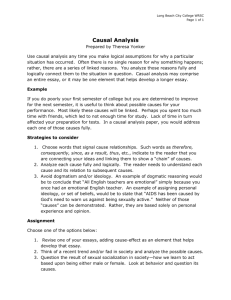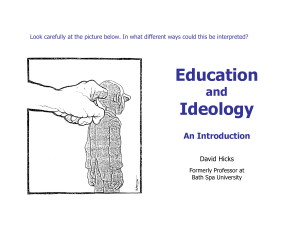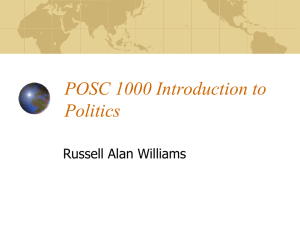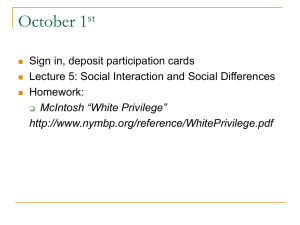POLITICAL IDEOLOGIES - Student subdomain for University of Bath
advertisement
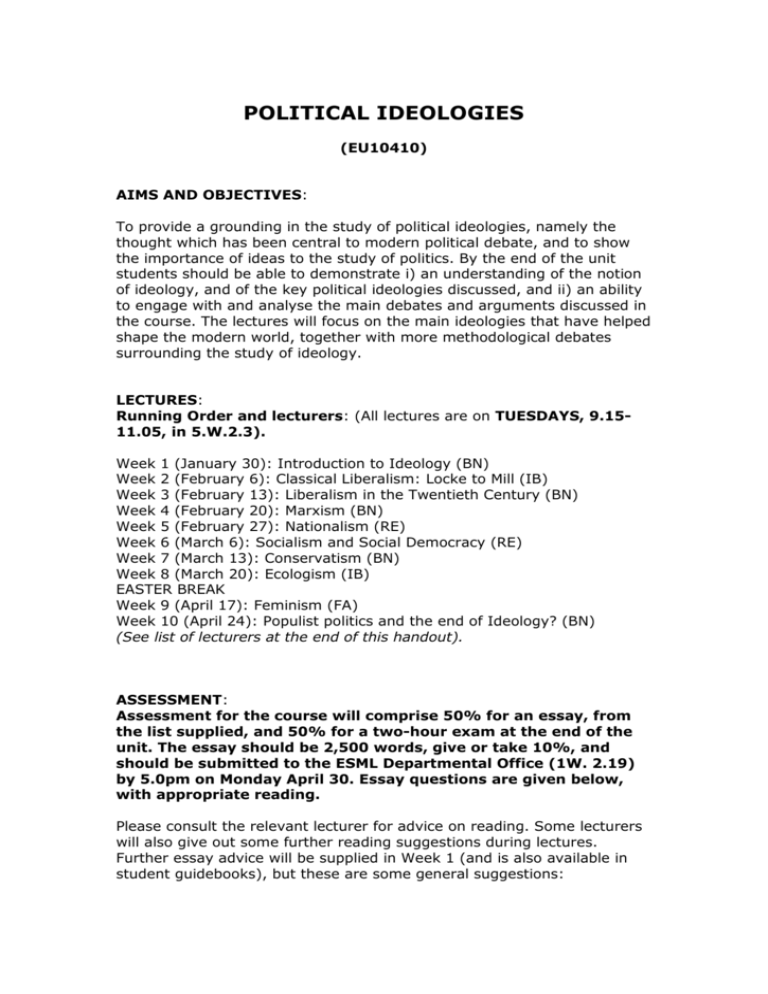
POLITICAL IDEOLOGIES (EU10410) AIMS AND OBJECTIVES: To provide a grounding in the study of political ideologies, namely the thought which has been central to modern political debate, and to show the importance of ideas to the study of politics. By the end of the unit students should be able to demonstrate i) an understanding of the notion of ideology, and of the key political ideologies discussed, and ii) an ability to engage with and analyse the main debates and arguments discussed in the course. The lectures will focus on the main ideologies that have helped shape the modern world, together with more methodological debates surrounding the study of ideology. LECTURES: Running Order and lecturers: (All lectures are on TUESDAYS, 9.1511.05, in 5.W.2.3). Week 1 (January 30): Introduction to Ideology (BN) Week 2 (February 6): Classical Liberalism: Locke to Mill (IB) Week 3 (February 13): Liberalism in the Twentieth Century (BN) Week 4 (February 20): Marxism (BN) Week 5 (February 27): Nationalism (RE) Week 6 (March 6): Socialism and Social Democracy (RE) Week 7 (March 13): Conservatism (BN) Week 8 (March 20): Ecologism (IB) EASTER BREAK Week 9 (April 17): Feminism (FA) Week 10 (April 24): Populist politics and the end of Ideology? (BN) (See list of lecturers at the end of this handout). ASSESSMENT: Assessment for the course will comprise 50% for an essay, from the list supplied, and 50% for a two-hour exam at the end of the unit. The essay should be 2,500 words, give or take 10%, and should be submitted to the ESML Departmental Office (1W. 2.19) by 5.0pm on Monday April 30. Essay questions are given below, with appropriate reading. Please consult the relevant lecturer for advice on reading. Some lecturers will also give out some further reading suggestions during lectures. Further essay advice will be supplied in Week 1 (and is also available in student guidebooks), but these are some general suggestions: i) ii) iii) iv) v) vi) Provide proper references, and in addition a bibliography with full details of work consulted, including publishers and place of publication for books. See the Library handout, 'A Guide to Citing References', on referencing style. Structure your essay around what you see as key arguments and debates, making supporting reference to your sources. Where this is possible explore and examine some primary works of political thought, as well as secondary surveys and summaries in text-books, and critical discussions in journal articles. Examine arguments or debates in sufficient depth, in your own words, adding quotations where relevant. Introduce your approach to the question in your opening paragraphs, and offer conclusions, drawing on your previous work in the essay, at the end. Remember that the essay is a literary form, and that you need to communicate your work, your social science, as clearly and effectively as possible to your readers. KEY BOOKS AND BOOKS TO BUY: In terms of recommended books with chapters relevant to most topics see Roger Eatwell and Anthony Wright (1999), below, and Matthew Festenstein and Michael Kenny, Political Ideologies (Oxford, 2005). Note that I have not noted relevant chapters of these two books in each topic reading list below. There are a number of rival textbooks that cover most, if not all, of the topics covered in the lectures. Students are advised to buy one of them. Probably the one that is nearest to the content of the course is Roger Eatwell and Anthony Wright, eds., Contemporary Political Ideologies (London: Continuum, 1999). Other relevant texts are Robert Eccleshall et al, Political Ideologies, An Introduction (Routledge, 1994), and Andrew Haywood, Political Ideologies, An Introduction (Macmillan, 1998). A useful book of readings is Matthew Festenstein and Michael Kenny, eds., Political Ideologies (Oxford: Oxford University Press, 2005). The new Penguin edition of Marx and Engel's The Communist Manifesto, with a long introduction by Garath Stedman Jones, might also be worth buying, at £3.99. Another book that is useful on a number of ideologies is Adam Lent, ed., New Political Thought: An Introduction, (Lawrence & Wishart, 1998. Note also the second edition of Ian Adams, Political Ideology Today (Manchester University Press, 2001). SEMINARS: AIM The seminars aim at helping the students to obtain better understanding of the key issues for the Unit, to develop their presentation skills and to prepare for the course work and the exam. STRUCTURE There will be 5 seminar groups (of not more than 25 students each) that will meet fortnightly. Details, times and rooms to follow. Students will be asked to sign up for ONE of the groups and to keep to these group meetings. Switching between groups will not normally be allowed. TOPICS The seminars will cover the lecture topics offering the students the possibility to clarify and discuss questions related to the topics of their interest. The seminars will cover the topics as follows: Seminar 1: 1. Introduction to Ideologies (Essay problems of defining a political ideology) Question: Discuss the Seminar 2: 1. Classical Liberalism / Liberalism in the Twentieth Century (Essay Question: The heart of liberalism is the doctrine of individual liberty. But in a highly organised society like our own, is individual liberty feasible? Discuss with reference to the relevant literature) 2. Marxism (Essay Question: Can the ideology of Marxism be separated from its subsequent interpretations?) Seminar 3: 1. Nationalism (Essay Question: ’Nationalism is…essentially subhuman and primitive in character, a deformity which no rational or civilised person would have anything to do’ (Miller, p. 5). Discuss) 2. Socialism and Social Democracy (Essay Question: ‘As a system, socialism is dead, as a movement it is on its last legs. All the goals it once proclaimed are out of date.’ Do you agree with Andre Gorz’s statement?) 3. Feminism (Essay Question: Critically assess feminism as a political ideology) Seminar 4: 1. Conservatism (Essay Question: In what sense is there a contemporary ideology of conservatism that is both logically consistent and relevant?) 2. Ecologism (Essay Question: Is there a particularly close relationship between ecologism and any of the 19th century ideologies?) 3. End of Ideology? / Populist Politics: Post Ideology? (Essay Question: Explore the extent and assess the implications of the deideologisation of politics) Attendance is compulsory and therefore will be monitored. Students are expected to prepare for the classes and to take active participation in the discussions. TOPIC READING: 1. Introduction to Ideologies Essay Question: Discuss the problems of defining a political ideology. Core Reading: From the texts mentioned above see R. Eatwell, ‘Introduction: What are Political Ideologies?’, in Eatwell/Wright (1999); I. MacKenzie, ‘Introduction: the arena of ideology’, in Eccleshall (1994), and chapter 1 of Heywood (1992). Other G. Duncan, ‘Understanding Ideology’, Political Studies, 35, 1987 M. Freeden, Ideologies and Political Theory: A Conceptual Approach, (Oxford University Press, 1996). M.B.Hamilton, ‘The Elements in the Concept of Ideology’, Political Studies, 35, 1987. K. Mannheim, Ideology and Utopia: An introduction to the Sociology of Knowledge, 1936. M. Seliger, Ideology and Politics, 1976. A. Shtromas, ed., ‘The End of Isms?’, special edition of Political Studies, 43, 1993. J.B. Thompson, Ideology and Modern Culture, 1990, esp. chapters 1 & 2. 2. Classical Liberalism 3. Liberalism in the Twentieth Century Essay Question: The heart of liberalism is the doctrine of individual liberty. But in a highly organised society like our own, is individual liberty feasible? Discuss with reference to the relevant literature. (Note: You might want to answer this question by reference to either work from the 'classical' period, or from twentieth century work). Core Reading: R. Bellamy, ‘Liberalism’, in Eatwell/Wright (1999); R. Eccleshall (Chapter 2), in Eccleshall et al (1994). M. Festenstein, ‘Contemporary Liberalism’, in A. Dent (1998). Other Reading: General: A. Arblaster, The Rise and Decline of Western Liberalism, (Blackwell, 1984). R. Bellamy, Rethinking Liberalism (2000) J. Gray, Liberalism, 2nd ed., (Open University Press, 1995). Classical: J. Locke, The Second Treatise on Government (various editions). (1690) J.S.Mill, On Liberty. (various editions) 20th Century: I.Berlin, ‘Two Concepts of Liberty’, in I. Berlin, Four Essays on Liberty, 1969 F.A.Hayek, The Road to Serfdom (1944) F.A.Hayek, 'The principles of a liberal social order', in F.A. Hayek, Studies in Philosophy, Politics and Economics (1967) L.T. Hobhouse, Liberalism, (Cambridge University Press, 1994). (1911). R. Nozick, Anarchy, State and Utopia (1974) D.J.Manning, Liberalism, 1976. J. Rawls, A Theory of Justice, (Oxford University Press, 1971) 4. Marxism Essay Question: Can the ideology of Marxism be separated from the uses to which it was put? Reading: S. Avineri, ed., The Social and Political Thought of Karl Marx, 1968. T. Bottomore, ed., A Dictionary of Marxist Thought, 1983. T. Bottomore & M. Rubel, eds., Selected Writings in Sociology and Social Philosophy, 1961. J. V. Femia, ‘Marxism and Communism’, in Eatwell/Wright (1999) J.V. Femia, ‘Gramsci: Marxism’s Saviour or False Prophet?’, Political Studies, 37, 1989. N. Harding, Leninism, 1996. Q. Hoare and G. Nowell Smith, Selections from the Prison Notebooks of Antonio Gramsci, 1971. V.I.Lenin, What is to be Done?, 1902. (See the introduction by R. Service in his edited edition of 1988). V.I. Lenin, The State and Revolution, 1917. (See the edition edited by R. Service for an introduction). L.Kolakowski, Main Currents of Marxism, 3 volumes, 1978, see vol. II, esp. chapter XVIII on Leninism. H. Marcuse, One Dimensional Man, 1964. K. Marx and F. Engels, The Communist Manifesto, 1848. D. McLellan, ed., Karl Marx, Selected Writings, Oxford University Press, 1977. D. McLellan, Marx: the First 100 Years, 1983. D. McLellan, Marxism: Essential Writings, 1988. R. Mayer, ed., ‘Lenin, the Proletariat and the Legitimation of Dictatorship’, Journal of Political Ideologies, 1997. K.R.Popper, The Open Society and Its Enemies, vol. 2, 1945. 5. Nationalism Essay Question: ’Nationalism is…essentially sub-human and primitive in character, a deformity which no rational or civilised person would have anything to do’ (Miller, p. 5). Discuss. Reading: Introductory: B. Goodwin, ‘Beyond Ideology: Nationalism’, in B. Goodwin, Using Political Ideas, 1997. R. Griffin, ‘Nationalism’, in Eatwell/Wright (1999) R.Jay, ‘Nationalism’, in Eccleshall et al (1994) A. Vincent, Modern Political Ideologies, (Blackwell, 1995). Other: P. Alter, Nationalism, 1989. B.Anderson, Immagined Communities, 1983. M. Canovan, Nationhood and Political Theory, 1996. M. Canovan, 'Sleeping Dogs, Prowling Cats and Soaring Doves: Three Paradoxes in the Political Theory of Nationhood', Political Studies, 2001 M.Freeden, ‘Is Nationalism a Distinct Ideology’, Political Studies, 46, 1998. J. Hutchinson, A.D.Smith, eds., Nationalism, (Oxford University Press,1994). E. Kamenka, Nationalism, 1976. E. Kedourie, Nationalism, (Hutchinson, 1966). P.Spencer & H. Wollman, 'Good and Bad Nationalism', Journal of Political Ideologies, 3, 1998 A. Vincent, 'Liberal Nationalism: an Irresponsible Compound?', Political Studies, 45, 1997. S.Woolf, ed., Nationalism in Europe, 1996. 6. Socialism and Social Democracy Essay Question: ‘As a system, socialism is dead, as a movement it is on its last legs. All the goals it once proclaimed are out of date.’ Do you agree with Andre Gorz’s statement? Reading: Introductory: V. Geoghegan, ‘Socialism’, in R. Eccleshall et al (1994). Wright, ‘Social Democracy and Democratic Socialism’, in Eatwell/Wright (1994). R. Barker, Political Ideas in Modern Britain, (1997). N. Bobbio, Left and Right (1996). A Callinicos, Against the Third Way (2000) A. Crick, Socialism, (Open University Press, 1987). Demos (British new politics think tank): http://www.demos.co.uk A. Giddens, The Third Way: The Renewal of Social Democracy, (Polity, 1998). A. Giddens, The Third Way and Its Critics, (Polity, 2000). J. Gray, After Social Democracy (1996). D. Jahn and M. Henn, 'The "New" Rhetoric of New Labour', West European Politics, 2000. L. Martell (ed.), Social Democracy (2001) D. Miller, ‘In what sense must Socialism be Communitarianism?’, Social Philosophy & Politics, 1989. (See also his chapter in E. P. Paul et al, eds., Socialism, 1989. R. Milliband, Socialism for a Sceptical Age, 1994 D. Sassoon, The New European Left, 1999. S. White (ed.), New Labour: the Progressive Future (2001) A. Wright, in A. Wright, Socialisms: Theories and Practices, chapter 7. 7. Feminism Essay Question: Critically assess feminism as a political ideology. Reading: V. Bryson, ‘Feminism’, in Eatwell/Wright (1999) V. Bryson, Feminist Political Thought: An Introduction, 1992. D. Coole, Women in Political Theory, 2nd ed., 1993 J. Evans, Women and Political Theory, 1986. M.Freeden, Ideologies and Political Theory, 1996, chapter 13. M. Lloyd, ‘Feminism’, in A. Lent, ed., (1998) J. Mitchell & A. Oakley, eds., What is feminism?, 1986 V. Randall, ‘Feminism and Political Analysis’, Political Studies (Journal), 1991. S. Rowbotham et al, Beyond the Fragments, 1979. N. Water, The New Feminism, 1998. R. Wilford, ‘Feminism’, in Eccleshall et al (1994) 8. Ecologism Essay Question: Is there a particularly close relationship between ecologism and any of the 19th century ideologies? General Reading: J. Barry, ‘Green Political Thought’, in A. Dent, ed., (1998). A. Dobson, ‘Ecologism’, in Eatwell/Wright (1999) A. Heywood, chapter 9, in Haywood (1998). M. Kenny, ‘Ecologism’, in R. Eccleshall et al (1994) Other: B. Capra & C. Spretnak, Green Politics, 1984. A. Dobson, Green Political Thought, (Routledge, 2000).. M. Freeden, Ideologies and Political Theory, 1996, chapter 14. J. Galtung, ‘The Green Movement’, International Sociology, (Journal) 1, 1, 1986. R. Goodin, Green Political Theory, 1992. R. Inglehardt, The Silent Revolution, 1977. P. Lowe & W. Rudig, ‘Review Article: Political Ecology and the Social Sciences – the State of the Art’, British Journal of Political Science, 1986. J. Poritt, Seeing Green, 1984. 9. Conservatism Essay Question: In what sense is there a contemporary ideology of conservatism that is both logically consistent and relevant? Core Reading: N. O’Sullivan, ‘Conservatism’, in Eatwell/Wright (1999). R. Eccleshall, ‘Conservatism’, in R. Eccleshall et al (1994) Other: R. Eatwell & N. O’Sullivan, The Nature of the Right, (Pinter, 1989). M. Freeden, Ideologies and Political Theory, Oxford University Press, 1996, Part III. M. Friedman, Capitalism and Freedom, 1982. J. Gray, Enlightenment’s Wake: Politics and Culture at the Close of the Modern Age, 1995, chapter 7. J. Gray & D. Willetts, Is Conservatism Dead?, Profile Books, 1997. M. Harris, ‘The New Right’, in A. Dent, ed., New Political Thought, 1998. F.A.Hayek, The Road to Serfdom, (Routledge & Kegan Paul, 1944). T. Honderich, Conservatism, 1992. A. Jeffries, ‘British Conservatism: individualism and gender’, Journal of Political Ideologies, 1996. R. Nichols, “’Conservatism’ and ‘the Right’ in America: ideological conflict, categories and language”, Journal of Political Ideologies, 1997. M. Oakeshott, Rationalism in Politics, 1967. (Conservative defence of pragmatism and practical knowledge over ‘rationalistic’ ideology. D. Willets, Modern Conservatism, 1992. 10. End of Ideology? Essay Question: Explore the extent and assess the implications of the deideologisation of politics. Reading: D. Bell, The End of Ideology, On the Exhaustion of Political Ideas in the Fifties, Free Press, 1962. (See also the ‘Afterword’ in the 1988 edition). D. Bell, The Cultural Contradictions of Capitalism, 1978. (Second thoughts about the viability of the liberal democratic-capitalist ethic?) D. Bell, ‘The End of Ideology Revisited’ (two articles), Government and Opposition, (Journal) 23, 1988. (attempt to defend his 1960 view). C. Fukuyama, The End of History and the Last Man, 1992. S.M.Lipset, Political Man, 1960 (esp. the last chapter on the end of ideology). K. Minogue, Alien Powers: The Pure Theory of Ideology, 1985. (Sweeping anti-Marxist work). New Left Review (journal), No 193, 1992. Extended left-wing reviews of Fukuyama’s book by F. Halliday, M. Rustin and R. Milliband. M. Oakeshott, Rationalism in Politics, 1967. (Conservative defence of pragmatism and practical knowledge over ‘rationalistic’ ideology. S. Thompson, ‘Postmodernism’, in A. Dent (1998) (a useful survey). 11. Populist Politics: Post Ideology? Essay Question: Is Populism a distinct ideology, or a post-ideological phenomenon? Reading: (See also the reading for (10), above). M. Canovan, Populism, 1981. M. Canovan, ‘Trust the People: Populism and the two Faces of Democracy’, Political Studies, 45, 1999. L. Goodwyn, Democratic Promise: the Populist Moment in America, 1976. J. Haywood, ed., Elitism, Populism and European Politics, 1996. G.Ionescu and E. Gellner, eds., Populism, 1969 (especially MacRae) D.Katz, R. Popkin, Messianic Revolution: Radical Religious Parties to the End of the Second Millennium, Allen Lane, 1998. P. Taggart, Populism, 2000 T. Di Tella, ‘Populism in the Twenty-first Century’, Government and Opposition, 32, 1997. Dr Felia Allum <alum@waitrose.com> Dr Ingolfur Bluehdorn, 1WN.2.36 <mlsib> Professor Roger Eatwell, IWN. 2.16 <mlsre> Brian Neve, IWN. 4.24 <B.P.Neve@bath.ac.uk> (Unit Coordinator) January 30, 2007

